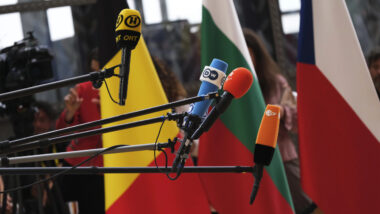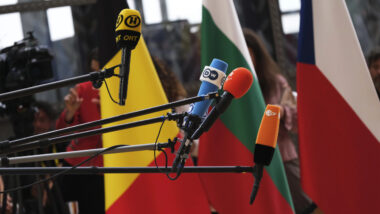 Joe McNamee, the European Policy Affairs Coordinator for European Digital Rights (EDRi), recently discussed the current EU Commission’s plans to introduce internet blocking measures with the British webportal Index on Censorship: Out of sight, out of mind. On this theme, I asked him a few questions to further illuminate this topic. Here is the interview:
Joe McNamee, the European Policy Affairs Coordinator for European Digital Rights (EDRi), recently discussed the current EU Commission’s plans to introduce internet blocking measures with the British webportal Index on Censorship: Out of sight, out of mind. On this theme, I asked him a few questions to further illuminate this topic. Here is the interview:
(Hier ist die deutsche Übersetzung)
netzpolitik.org: Cecilia Mälmström presented an initiative today which aims to combat child pornography on the internet. Are these plans new?
Yes and no. The idea of Internet blocking from the Commission is not new. There was a proposal in March 2009 as a „Framework Decision“, which in the pre-Lisbon legal environment, was basically a unanimous agreement between Member States to do something, but without any powers of the Commission to force implementation. Several Member States, most notably the UK, objected to this proposal because they don’t have and don’t want a blocking law. This approach, „self regulation“ (i.e. coercion of ISPs through threats like „either you block or we say you support child abuse“) was definitively ruled illegal by the European Commission in its „impact assessment“ on this proposal, which stated that “ Such measures must indeed be subject to law, or they are illegal“:
Impact assessment (PDF) and Proposal (PDF).
Subsequently, in June of last year, the Commission made a non-binding opinion on the Stockholm Programme. This proposed both Internet blocking and, possibly even worse for the global Internet, the „revoking“ of IP addresses abroad.
So, there are two new and crucial differences:
1. This is the first proposal for binding AND enforceable legislation.
2. The Commission’s new proposal suggests that Member States bring about a sufficiently high level of blocking, by whatever means they deem appropriate – it avoids demanding a law, in order to avoid objections from countries like the UK. So, they have moved from considering non-law-based blocking being illegal to actively to consciously adapting their proposal to facilitate this (by their definition) illegal approach.
netzpolitik.org: Criticisms of the plans focus particularly on the issue of internet blocking, which has been a sensitive topic in Germany since last year. What is the problem with this idea?
This is a huge question – the 200 page study on the issue issued last year by Aconite. The executive summary is very good. In essence, there are various clusters of problems which surround blocking – in my view, any one of those clusters would be a reason enough on its own to oppose this measure.
a. Child protection: It leaves the material online. It leaves it online in countries that we should be able to trust to delete it. It leaves it online and leaves the victims unprotected and unidentified. It leaves it online and leaves the criminals behind the websites unprosecuted.
b. Technology creep: The technology currently used does not work. Once the principle of blocking has been agreed, we will find ourselves faced with more and more invasive methods of blocking. Already, we see Virgin Media in the UK proposing and implementing deep packet inspection.
c. Mission creep: Once blocking has been accepted for child abuse sites, it is absolutely inconceivable that it will not spread to gambling, intellectual property and, already in Lithuania „family values“
d. The proposal (a lot of damage has been done, even if it is ultimately not adopted) undermines our ability to support free speech internationally. Iran and China would justifiably laugh if we tried to simultaneously criticised them and built a content-wide blocking infrastructure.
netzpolitik.org: Internet blocking measures is only part of the proposed plans. Following today’s announcement, what other features in the plans could endanger citizen’s digital rights?
The third-party liability measures could be dangerous, although they are imported from the cybercrime Convention and have not, yet, caused problems. However, in the context of third party liability being pushed via ACTA, this might change.
netzpolitik.org: What are the next steps on the EU level and has the EU Commission already proposed a timetable?
The Commission’s next job is to convince the European Parliament. Over the next approximately 4 months, the Culture and Education Committee will present its comment, the Civil Liberties Committee will produce its report and then that report will be presented to the Parliament’s plenary session to be voted.
netzpolitik.org: There is a clear conservative majority in the European Parliament. In your opinion, what are the chances of organising a majority against internet blocking.
It is a little unfair to believe that being a conservative means that you automatically support populist policies. There are numerous conservatives that are prepared to take the time to understand issues like this. However, it is true that having an Italian pro-blocking conservative as the MdEP with responsibility for leading the work on this issue is a big problem. I would say that the chances are about 40%/60% against us at the moment. More unlikely victories have been achieved, with enough engagement from enough activists, we can win.
netzpolitik.org: What can readers do to become active and mobilise against these plans?
German MEPs are taking a leading role on this report. A German conservative (Frau Verheyen) is Schattenberichtserstatterin for the conservatives in the Culture Committee, a German Liberal (Ms Hirsch) is Schattenberichtserstatterin for the Liberal Group in the Culture Committee) and a German Socialist (Ms Sippel – who has already been working hard on this dossier) is Schattenberichtserstatterin in the responsible committee – Civil Liberties. Readers should contact any MdEP, particularly on Culture or Civil Liberties Committees – ideally addressing them personally – and explain which of the clusters of disadvantages („mission creep“, „technology creep“, child protection or international human rights credibility) makes them oppose the proposal.
netzpolitik.org: Many thanks for the interview.




my modest contribution: I started a facebook group http://www.facebook.com/?ref=home#!/group.php?gid=132364380108683
I really appreciate this post. I have been looking all over for this! Thank goodness I found it on Bing. You’ve made my day! Thank you again!
hogan scarpe http://www.hoganscarpeshoes.com/